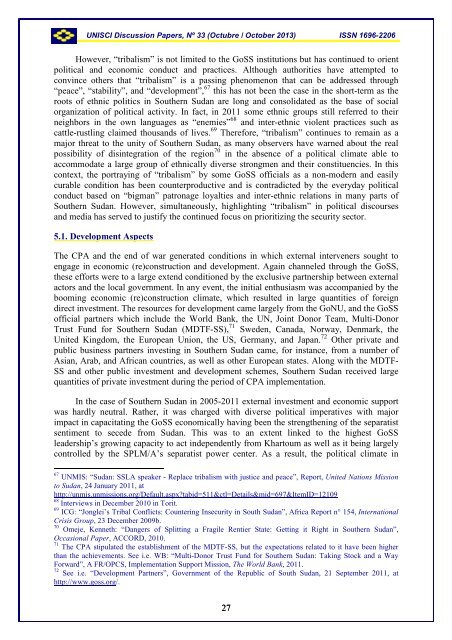UNISCI - Universidad Complutense de Madrid
UNISCI - Universidad Complutense de Madrid
UNISCI - Universidad Complutense de Madrid
You also want an ePaper? Increase the reach of your titles
YUMPU automatically turns print PDFs into web optimized ePapers that Google loves.
<strong>UNISCI</strong> Discussion Papers, Nº 33 (Octubre / October 2013) ISSN 1696-2206However, “tribalism” is not limited to the GoSS institutions but has continued to orientpolitical and economic conduct and practices. Although authorities have attempted toconvince others that “tribalism” is a passing phenomenon that can be addressed through“peace”, “stability”, and “<strong>de</strong>velopment”, 67 this has not been the case in the short-term as theroots of ethnic politics in Southern Sudan are long and consolidated as the base of socialorganization of political activity. In fact, in 2011 some ethnic groups still referred to theirneighbors in the own languages as “enemies” 68 and inter-ethnic violent practices such ascattle-rustling claimed thousands of lives. 69 Therefore, “tribalism” continues to remain as amajor threat to the unity of Southern Sudan, as many observers have warned about the realpossibility of disintegration of the region 70 in the absence of a political climate able toaccommodate a large group of ethnically diverse strongmen and their constituencies. In thiscontext, the portraying of “tribalism” by some GoSS officials as a non-mo<strong>de</strong>rn and easilycurable condition has been counterproductive and is contradicted by the everyday politicalconduct based on “bigman” patronage loyalties and inter-ethnic relations in many parts ofSouthern Sudan. However, simultaneously, highlighting “tribalism” in political discoursesand media has served to justify the continued focus on prioritizing the security sector.5.1. Development AspectsThe CPA and the end of war generated conditions in which external interveners sought toengage in economic (re)construction and <strong>de</strong>velopment. Again channeled through the GoSS,these efforts were to a large extend conditioned by the exclusive partnership between externalactors and the local government. In any event, the initial enthusiasm was accompanied by thebooming economic (re)construction climate, which resulted in large quantities of foreigndirect investment. The resources for <strong>de</strong>velopment came largely from the GoNU, and the GoSSofficial partners which inclu<strong>de</strong> the World Bank, the UN, Joint Donor Team, Multi-DonorTrust Fund for Southern Sudan (MDTF-SS), 71 Swe<strong>de</strong>n, Canada, Norway, Denmark, theUnited Kingdom, the European Union, the US, Germany, and Japan. 72 Other private andpublic business partners investing in Southern Sudan came, for instance, from a number ofAsian, Arab, and African countries, as well as other European states. Along with the MDTF-SS and other public investment and <strong>de</strong>velopment schemes, Southern Sudan received largequantities of private investment during the period of CPA implementation.In the case of Southern Sudan in 2005-2011 external investment and economic supportwas hardly neutral. Rather, it was charged with diverse political imperatives with majorimpact in capacitating the GoSS economically having been the strengthening of the separatistsentiment to sece<strong>de</strong> from Sudan. This was to an extent linked to the highest GoSSlea<strong>de</strong>rship’s growing capacity to act in<strong>de</strong>pen<strong>de</strong>ntly from Khartoum as well as it being largelycontrolled by the SPLM/A’s separatist power center. As a result, the political climate in67 UNMIS: “Sudan: SSLA speaker - Replace tribalism with justice and peace”, Report, United Nations Missionto Sudan, 24 January 2011, athttp://unmis.unmissions.org/Default.aspx?tabid=511&ctl=Details&mid=697&ItemID=1210968 Interviews in December 2010 in Torit.69 ICG: “Jonglei’s Tribal Conflicts: Countering Insecurity in South Sudan”, Africa Report n° 154, InternationalCrisis Group, 23 December 2009b.70 Omeje, Kenneth: “Dangers of Splitting a Fragile Rentier State: Getting it Right in Southern Sudan”,Occasional Paper, ACCORD, 2010.71 The CPA stipulated the establishment of the MDTF-SS, but the expectations related to it have been higherthan the achievements. See i.e. WB: “Multi-Donor Trust Fund for Southern Sudan: Taking Stock and a WayForward”, A FR/OPCS, Implementation Support Mission, The World Bank, 2011.72 See i.e. “Development Partners”, Government of the Republic of South Sudan, 21 September 2011, athttp://www.goss.org/.27
















